Librarian's Pick
Here's what our librarians are reading lately.Librarian’s Pick: IF: The Untold Story of Kipling’s American Years – Christopher Benfey
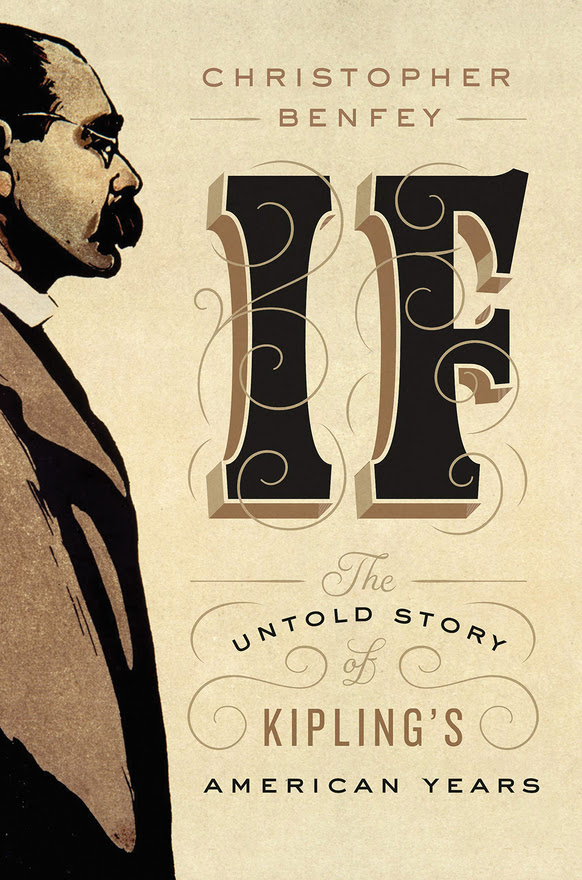
“Born in Bombay, Kipling spent parts of his childhood in India and parts in England, which shaped his rootless future as a newspaper reporter and bestselling writer. His wife, Carrie, was American, and soon after their 1892 marriage they settled into a cottage in her native Vermont. Kipling had first visited the U.S. three years earlier, at which time he made a pilgrimage to meet his role model, Mark Twain. Benfey marks this meeting as the beginning of the Englishman’s American decade, and Twain was only the first of many prominent men of the Gilded Age whom Kipling would encounter, befriend and occasionally cross swords with. He toured the recently opened National Zoo with Theodore Roosevelt, for instance—a magical moment for this writer of animal tales. (Despite Teddy’s passion for the grizzly bear, Kipling preferred the industrious beaver.)
In If, Benfey ties Kipling’s stateside experiences to the literary works that germinated during his time here. The Jungle Book, Benfey speculates, grew out of a fascination with wolves, long eradicated from the surrounding New England woods. Captains Courageous, written amid a U.S.–U.K. diplomatic crisis that unsettled Kipling, was his first genuinely American story. And Kim, regarded by many as Kipling’s masterpiece, owes a great debt to the quintessentially American Adventures of Huckleberry Finn.
Kipling reluctantly left America in 1896 amid a family altercation. “There are only two places in the world where I want to live,” he claimed. “Bombay and Brattleboro. And I can’t live in either.” Benfey suggests that Kipling held a conflicted affection for America similar to the one he had for India; both outposts shared an appealing unruliness and offered a limitlessness that stodgy old England could never supply. Yet his belief in the “white man’s burden” (a phrase he coined) clashed with U.S. notions of imperialism. For Kipling this idea was not merely about exploitation and profit but was tied to better intentions about helping “sullen peoples.” As leaden, misinformed and racist as Kipling’s views are in the 21st century, the complexity of his message endures.”
Librarian’s Pick: I Like To Watch – Emily Nussbaum
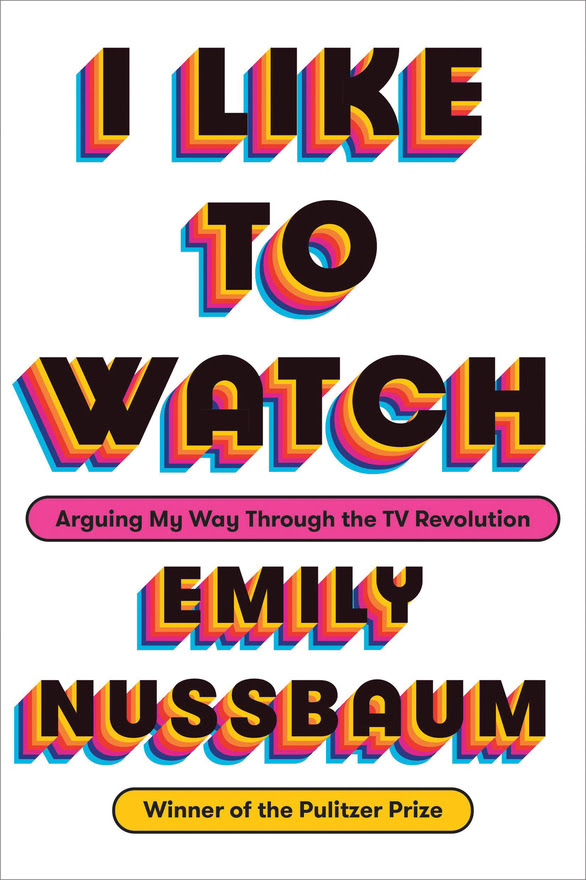 “Emily Nussbaum, the Pulitzer Prize-winning television critic for The New Yorker, explores the fascinating and ever-evolving medium of television in I Like to Watch: Arguing My Way Through the TV Revolution. This insightful, thought-provoking collection of essays includes both previously published and new work, with topics ranging from “difficult women” and exploring the legacy of “Sex and the City” to arts criticism in the age of Trump and how “Black-ish” rethinks the family sitcom.
“Emily Nussbaum, the Pulitzer Prize-winning television critic for The New Yorker, explores the fascinating and ever-evolving medium of television in I Like to Watch: Arguing My Way Through the TV Revolution. This insightful, thought-provoking collection of essays includes both previously published and new work, with topics ranging from “difficult women” and exploring the legacy of “Sex and the City” to arts criticism in the age of Trump and how “Black-ish” rethinks the family sitcom.
In the author’s preface, she explains her selection process: The essays aren’t about her favorite shows or based on any sort of rating system. Instead, she writes, “These reviews are simply the ones I thought held up the best as criticism—and also the ones that most effectively made my argument about TV.” And hold up they do, as Nussbaum turns her gaze on Joan Rivers, “Jane the Virgin,” “True Detective” and product integration.”
Librarian’s Pick: Your Life Is Mine – Nathan Ripley
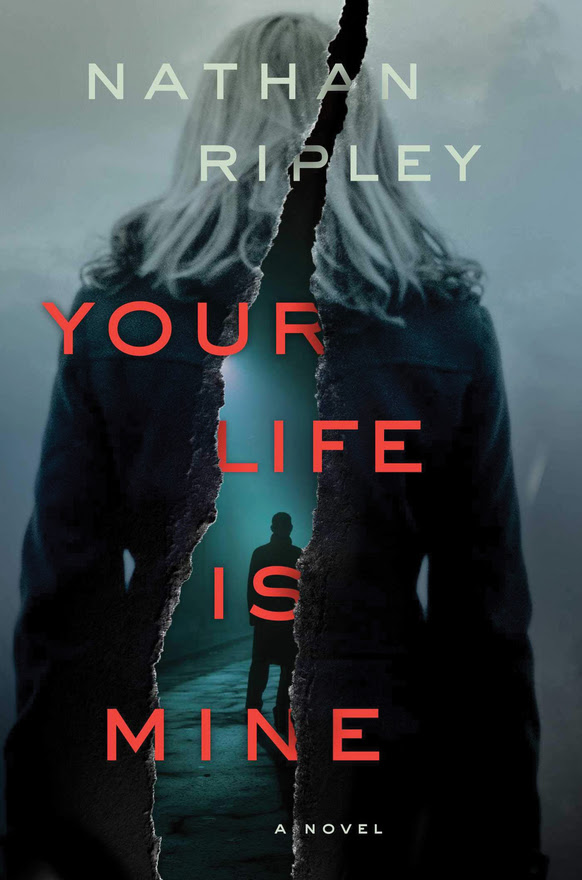 “Blanche Potter thought she had put her past behind her. She never talked about what happened when she was 7 years old. She changed her last name. She moved to a new city. She started a life of her own. But as the daughter of Chuck Varner, a deranged mass shooter, Blanche realizes the past may be buried, but it never goes away completely. Blanche learns that lesson the hard way in Nathan Ripley’s shocking new novel, Your Life Is Mine. Things are going well in her career as an up-and-coming filmmaker when she is told that her estranged mother, Crissy, has been shot and killed at her trailer home. News of Crissy’s death, brought to Blanche by a sleazy journalist who knows of her past, opens the floodgates of her memories and traumatic childhood. But as she tries to reconcile her past experiences with the recent death of her mother, someone else is gunning for her as well. The cult of Chuck Varner lives on, and it’s up to Blanche to stop it before his crazed follower can strike again. Ripley pulls no punches here, creating a tense and atmospheric story of personal identity and survival, while asking whether you can ever escape your past.”
“Blanche Potter thought she had put her past behind her. She never talked about what happened when she was 7 years old. She changed her last name. She moved to a new city. She started a life of her own. But as the daughter of Chuck Varner, a deranged mass shooter, Blanche realizes the past may be buried, but it never goes away completely. Blanche learns that lesson the hard way in Nathan Ripley’s shocking new novel, Your Life Is Mine. Things are going well in her career as an up-and-coming filmmaker when she is told that her estranged mother, Crissy, has been shot and killed at her trailer home. News of Crissy’s death, brought to Blanche by a sleazy journalist who knows of her past, opens the floodgates of her memories and traumatic childhood. But as she tries to reconcile her past experiences with the recent death of her mother, someone else is gunning for her as well. The cult of Chuck Varner lives on, and it’s up to Blanche to stop it before his crazed follower can strike again. Ripley pulls no punches here, creating a tense and atmospheric story of personal identity and survival, while asking whether you can ever escape your past.”
Librarian’s Pick: Late Migrations – Margaret Renkl
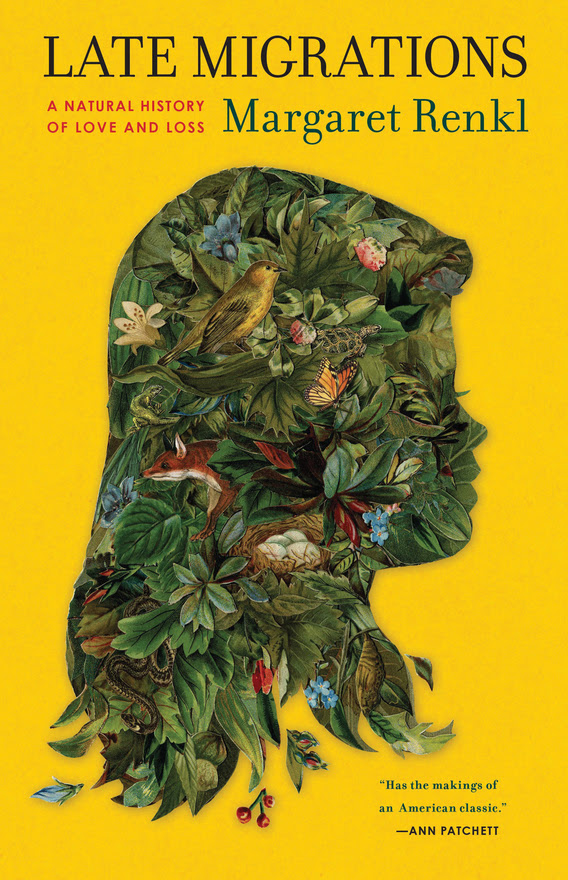 “Human beings are storytelling creatures, craning to see the crumpled metal in the closed-off highway lane, working from the moment the traffic slows to construct a narrative from what’s left behind. But our tales, even the most tragic ones, hinge on specificity. The story of one drowned Syrian boy washed up in the surf keeps us awake at night with grief. The story of four million refugees streaming out of Syria seems more like a math problem.”
“Human beings are storytelling creatures, craning to see the crumpled metal in the closed-off highway lane, working from the moment the traffic slows to construct a narrative from what’s left behind. But our tales, even the most tragic ones, hinge on specificity. The story of one drowned Syrian boy washed up in the surf keeps us awake at night with grief. The story of four million refugees streaming out of Syria seems more like a math problem.”
Margaret Renkl nestles that observation into “The Unpeaceable Kingdom,” an essay midway through Late Migrations: A Natural History of Love and Loss. But it could serve as a thesis for her collection.
Late Migrations is a collection of essays, some as short as a paragraph, that reconcile Renkl’s lived experience with the natural world around her. She resides in suburban Nashville, not a wilderness, and works at a desk, not in the outdoors. Even so, Renkl is so in touch with the birds and butterflies of her yard that one could mistake her for a trained naturalist. Indeed, she is known as a nature writer; as a New York Times contributing op-ed writer, she writes about flora and fauna, as well as the American South’s politics and culture.”
Librarian’s Pick: Tell Me Everything – Cambria Brockman
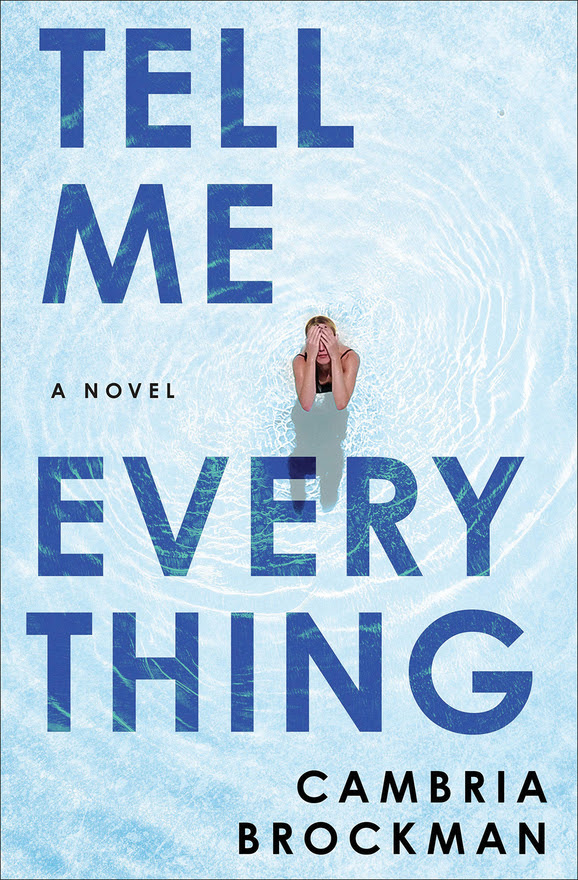 “Cambria Brockman’s riveting debut, Tell Me Everything, takes place on the campus of an exclusive New England college, where six friends form a destructive connection. Introvert Malin comes out of her shell at Hawthorne College, bonding with five other students: Ruby, Max, John, Khaled and Gemma. They’re a close-knit group, but as graduation approaches, their relationships begin to unravel. Gemma drinks too much, and John is increasingly cruel to Ruby, who is now his girlfriend. Malin, meanwhile, excels academically while concealing her very dark past. The anxieties of senior year peak at semester’s end as she struggles to uphold her self-assured facade. She isn’t the only one in the circle who’s hiding something, and when a murder occurs, the six friends’ lives change forever. Narrated by Malin, whose intelligence and cunning drive the story, Tell Me Everything is an edgy exploration of loyalty and human desire. Readers in search of a true page-turner will savor this electrifying novel.”
“Cambria Brockman’s riveting debut, Tell Me Everything, takes place on the campus of an exclusive New England college, where six friends form a destructive connection. Introvert Malin comes out of her shell at Hawthorne College, bonding with five other students: Ruby, Max, John, Khaled and Gemma. They’re a close-knit group, but as graduation approaches, their relationships begin to unravel. Gemma drinks too much, and John is increasingly cruel to Ruby, who is now his girlfriend. Malin, meanwhile, excels academically while concealing her very dark past. The anxieties of senior year peak at semester’s end as she struggles to uphold her self-assured facade. She isn’t the only one in the circle who’s hiding something, and when a murder occurs, the six friends’ lives change forever. Narrated by Malin, whose intelligence and cunning drive the story, Tell Me Everything is an edgy exploration of loyalty and human desire. Readers in search of a true page-turner will savor this electrifying novel.”
Librarian’s Pick: The Other Mrs. Miller – Allison Dickson
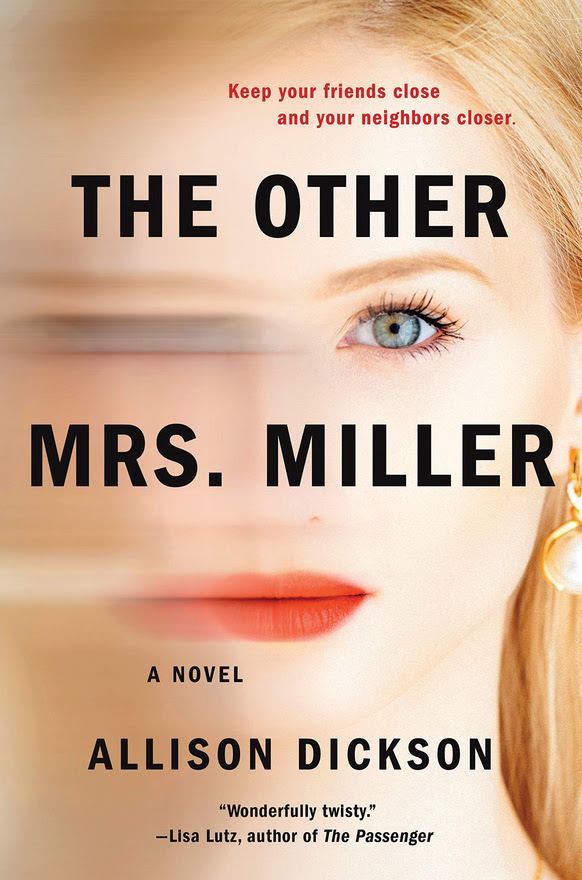 “Phoebe Miller is starting to believe her best years are behind her. Heiress to a fortune left by her philandering late father, she passes the days in a haze of alcohol. Arguments with her husband, Wyatt, add to her feelings of discontent. But her life takes an unexpected turn after the Napiers move in across the street. Ron, a doctor; Vicki, his wife; and Jake, their attractive and flirtatious teenage son, appear to be a model family. Vicki is eager to be friends, but Phoebe doesn’t quite trust her. She also suspects she’s being watched by the driver of a car that keeps returning to the neighborhood. When Phoebe receives a series of frightening notes that may have some connection to her father, she begins to fear for her life. With an impossible-to-predict plot and a very unexpected murder, Dickson’s book is required reading for suspense addicts.”
“Phoebe Miller is starting to believe her best years are behind her. Heiress to a fortune left by her philandering late father, she passes the days in a haze of alcohol. Arguments with her husband, Wyatt, add to her feelings of discontent. But her life takes an unexpected turn after the Napiers move in across the street. Ron, a doctor; Vicki, his wife; and Jake, their attractive and flirtatious teenage son, appear to be a model family. Vicki is eager to be friends, but Phoebe doesn’t quite trust her. She also suspects she’s being watched by the driver of a car that keeps returning to the neighborhood. When Phoebe receives a series of frightening notes that may have some connection to her father, she begins to fear for her life. With an impossible-to-predict plot and a very unexpected murder, Dickson’s book is required reading for suspense addicts.”
Librarian’s Pick: Whisper Network – Chandler Baker
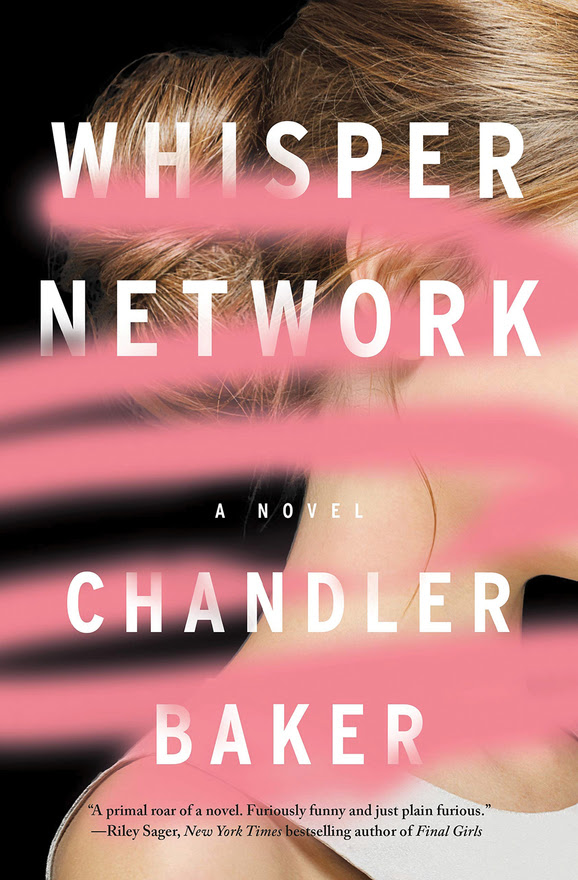
“In Whisper Network, Chandler Baker takes on sexual harassment in corporate America. Sloane, Ardie and Grace are in-house lawyers working for a Dallas-based athleisure apparel company. When the CEO suddenly dies, it becomes clear that Ames Garrett will most likely fill the role. Ames, however, has a well-earned reputation, whispered among female employees, for sexually harassing and assaulting women in the workplace for over a decade. Moreover, he shows no signs of stopping, if his actions toward the newest employee are any indicator. Sloane, Ardie and Grace must decide whether to bring Ames’ actions to light before his promotion. Unforeseeable consequences of their choice soon threaten all three women.
Baker has written a bitingly funny yet insightful novel detailing the pitfalls of being a woman in corporate America today. Throughout this well-crafted novel, Baker tells the story primarily through dialogue but also employs deposition and police interview transcripts. This structure creates a delicious sense of suspense that will keep the reader guessing. It’s the perfect choice for book clubs seeking an entertaining book that will stimulate thought-provoking discussion.”
Librarian’s Pick: Wanderers – Chuck Wendig
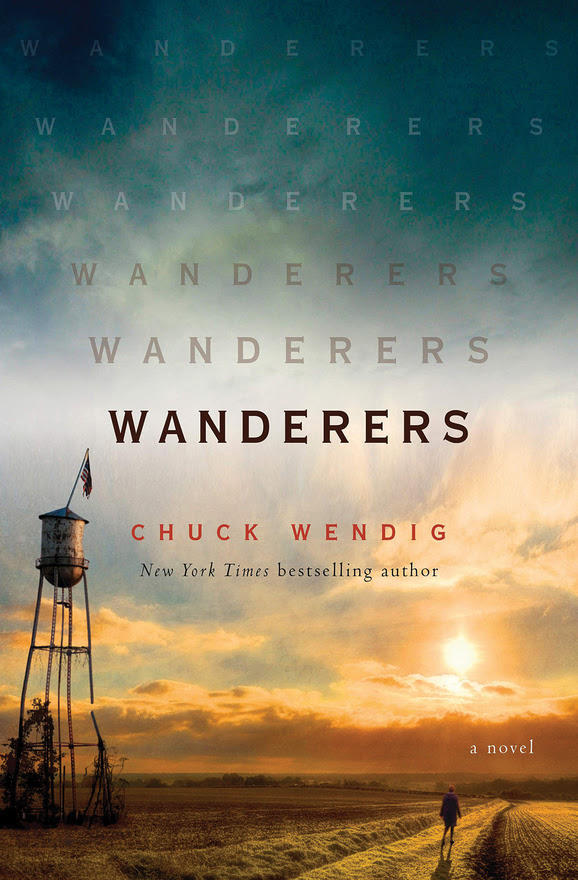 “The story begins with a young girl walking out of her house one morning with no shoes or supplies. Her sister tries to stop her, then her father, then EMTs and police, but still she walks. She is the beginning of an apparent epidemic of “sleepwalkers” that form a flock who walk—expressionlessly and painlessly—across the United States. In the midst of this mysterious outbreak come a series of characters—a disgraced CDC official, a woman who built the world’s most sophisticated artificial intelligence, a rock star, a preacher on the verge of crisis and the young girl’s older sister—who all have roles to play in unraveling the mystery of what’s to come. The walkers, you see, are just the beginning, and what follows is an American epic with the soul of the nation—and the world—at stake.”
“The story begins with a young girl walking out of her house one morning with no shoes or supplies. Her sister tries to stop her, then her father, then EMTs and police, but still she walks. She is the beginning of an apparent epidemic of “sleepwalkers” that form a flock who walk—expressionlessly and painlessly—across the United States. In the midst of this mysterious outbreak come a series of characters—a disgraced CDC official, a woman who built the world’s most sophisticated artificial intelligence, a rock star, a preacher on the verge of crisis and the young girl’s older sister—who all have roles to play in unraveling the mystery of what’s to come. The walkers, you see, are just the beginning, and what follows is an American epic with the soul of the nation—and the world—at stake.”
Librarian’s Pick: The Accident of Color – Daniel Brook
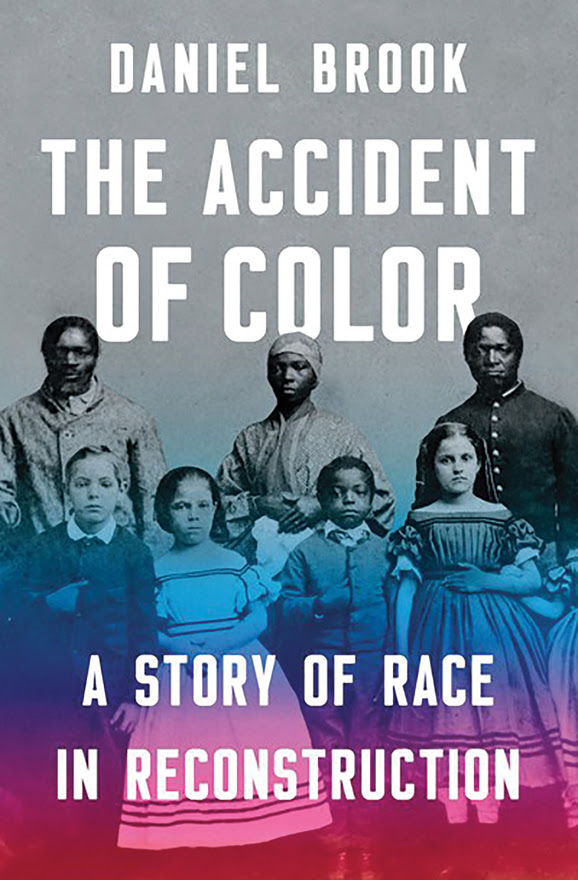 “Daniel Brook’s The Accident of Color: A Story of Race in Reconstruction is fast-paced and intriguing, revelatory and provocative. Drawing deeply on archival materials, Brook brings to life the complex notions of race that developed in the years leading up to the Civil War and the ways that various forces diminished such complexity during Reconstruction, reducing race to the restrictive binary—individuals are either black or white—that dominates conversations about and practices surrounding race in America today.
“Daniel Brook’s The Accident of Color: A Story of Race in Reconstruction is fast-paced and intriguing, revelatory and provocative. Drawing deeply on archival materials, Brook brings to life the complex notions of race that developed in the years leading up to the Civil War and the ways that various forces diminished such complexity during Reconstruction, reducing race to the restrictive binary—individuals are either black or white—that dominates conversations about and practices surrounding race in America today.
Focusing primarily on Charleston, South Carolina, and New Orleans, Louisiana, Brook reveals that multiracial groups—Creoles of color in New Orleans and Browns in Charleston—worked to promote the liberty and equality promised to all men in the Declaration of Independence. For example, Creoles educated their children in private academies in New Orleans. Both in Charleston and New Orleans, multiracial people were prosperous landlords and hairstylists and business owners. These free people of color sometimes owned slaves, but following the Emancipation Proclamation, multiracial individuals often formed alliances with freedmen to work against white politicians’ and landowners’ attempts to legislate segregation based on race.
Along the way, we meet characters such as Pierre Gustave Toutant Beauregard of New Orleans and Francis Lewis Cardozo of Charleston, each of whom led groups of freedmen and free men of color and lobbied to be subject to the same laws that govern white men. By the end of Reconstruction, however, both states had established Jim Crow laws that rigidly defined race as either black or white, with black people determined as those with just one drop of African or Caribbean blood in their ancestry.
Brook’s illuminating and lively study illustrates that, given the diverse heritage of America, it was never possible for races to be separate. He concludes that the racial binary is a social construct and that, in truth, American history is Creole history.”
